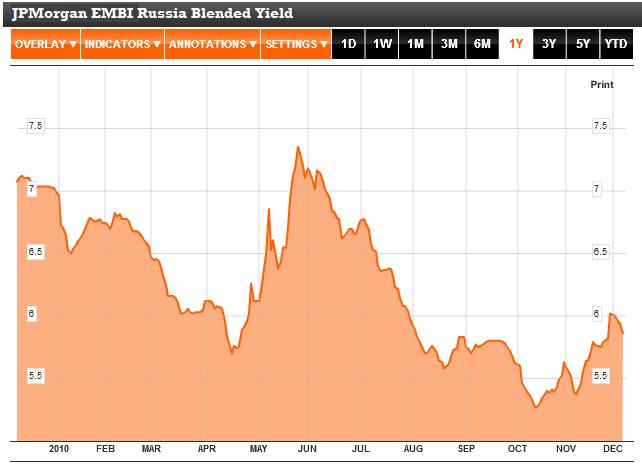Forex Blog |
| Russian Ruble Undervalued According to Central Bank Posted: 09 Dec 2010 01:09 PM PST In the midst of the currency war controversy, there is one emerging market country that continues to insist that its currency is undervalued: Russia. While being a member of the illustrious group of BRIC (Brazil / Russia / India / China) countries would seem to guarantee an appreciating currency, there are strong forces weighing on the Ruble. In other words, that it remains weak is not due to investor oversight. If you view the performance of the Russian Ruble over the last few years, it’s clear that it never recovered from the rapid depreciation that took place during the height of the credit crisis. Given that nearly every other emerging market currency is either closing in on or has already breached its pre-credit crisis level, there must be something holding down the Ruble. That something happens to be a sizable current account deficit. Unlike with other emerging markets, capital is actually flowing out of Russia. There are a few reasons for this: first of all, much of Russia’s debt is denominated in foreign currency, as a consequence of its massive default in 1998. Specifically, “The private sector has about $16 billion in foreign debt, including interest-rate payments, due this month [December], double the $8 billion of redemptions in October and November.” This means that every month, Russian companies must scramble to exchange Rubles for Dollars and Euros. Next, the real returns of investing in Russia are currently negative. Russia’s Central Bank (Bank Rossii) continues to maintain the benchmark refinancing rate at a record-low 7.75%, and the 10-year yield on Russian bonds is even lower, at ~5%. This would seem to compare favorably with the 2.75% yield on comparable US Treasury Securities until you account for inflation, which is projected to top 8% for the year. While Ruble-denominated bonds pay a higher interest rate (7.75%), they also carry higher risk. For that reason, Russian yields and credit default swap spreads (which insure against default) are much higher in Russia than in other BRIC countries.
Meanwhile, Russian companies are taking advantage of low borrowing rates to engage in a reverse carry trade and invest in western countries: “Russian companies have announced $27 billion of foreign purchases this quarter, the most since the third quarter of 2008 and triple the amount in the last three-month period.” Finally, the reemergence of the EU fiscal crisis, combined with the skirmish in Korea has spurred a decrease in risk appetite. As one analyst summarized, “The whole of the emerging markets are on the back-foot at the moment and the ruble is no exception…it's definitely risk off at the moment.” As a result, Bank Rossii finds itself in a somewhat unique position among Central Banks of having to try to prop up its currency. Technically, the Rouble is pegged to a basket (consisting of 55% Dollars and 45% Euros), but pressure on it has been so intense that the range in which it is permitted to trade has been adjusted downward five times since the middle of October. To prevent it from declining further, Bank Rossii has been dipping into its $450 Billion stock of forex reserves, and selling foreign currency at the rate of $150 million per day. It insists that it will “allow” the Rouble to appreciate in 2011 in order to fight inflation, but that obviously depends on whether the current account shifts back to surplus. What do investors think? According to a Bloomberg survey of currency analyst, “The Ruble will strengthen 4 percent versus the basket by the end of the first quarter of 2011. On the other hand, “Options traders are still bearish on the ruble with the currency's one-week risk reversal rate — the premium of put options over calls — at 1.25 percent for the tenth straight day, from 0.5 percent at the end of October.” Non-deliverable forward contracts, meanwhile, reflect a weaker Ruble three months from now. If the Bank Rosii fulfills analysts’ expectations and hikes rates in March, it will be step towards reinvigorating investor interest in Russia. More importantly, however, is that inflation is brought under control. Until that happens, the Ruble will remain the main standout in a sea of emerging market currencies that otherwise continues to outperform.  |
| You are subscribed to email updates from Forex Blog To stop receiving these emails, you may unsubscribe now. | Email delivery powered by Google |
| Google Inc., 20 West Kinzie, Chicago IL USA 60610 | |



No comments:
Post a Comment